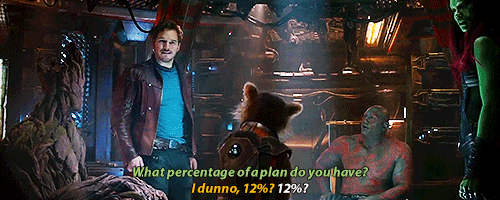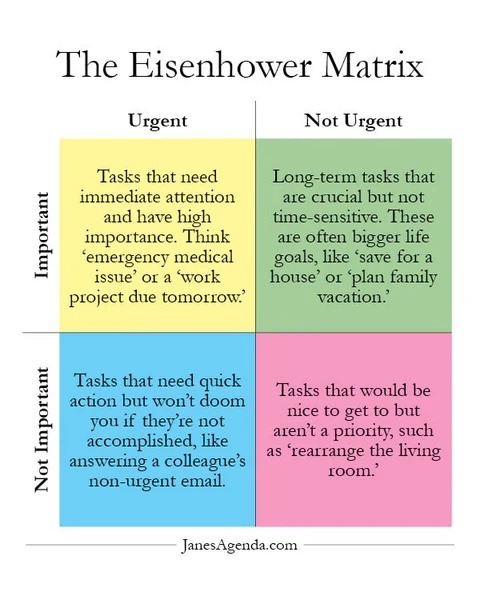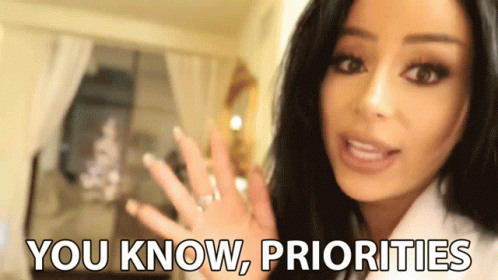#prioritization
Explore tagged Tumblr posts
Text
Guide to Prioritising



I saw a post about this and I disagreed with some of the things they said in the post, so I wanted to make my own! While I disagreed with some of the stuff in it, it's still a really helpful guide and you can read it here if you want to.
Sometimes, you have unproductive days where you just procrastinate, and that's ok. You are not pathetic or lazy for doing that. Procrastination is usually a sign that you are overwhelmed and burnt out, which means you probably need to take a break. But what do you do when you really need to finish an assignment for school or a project for work and you still want to procrastinate? This is where prioritising can help you! Figuring out what needs to get done first and what things can wait can decrease your overall workload. So, here's how to do it:
Step 0: The Non-negotiables
These are things you need to remember to prioritise above anything else. These are things that people forget about sometimes, especially in times of stress.
Sleep
Drink water
Eat breakfast, lunch, and dinner (don't just have little snacks, you need at least 2-3 proper meals)
Take breaks - you need to take breaks as you're working. You can use the pomodoro method if you want, or something else. I like to do 1-2hrs of work and then a 30-40min break.
Make sure that you prioritise these first! Now that we have that out of the way, let's begin with step 1.
Step 1: What are the most important things?
Figure out what things need to be done now and cannot be put off. These are things that need to be done today, tomorrow, or within the next 3-5 days. If you want to write a to-do list, these are the things that should be at the top and should be done first. It might be a bill you need to pay, it might be some homework you need to do, it might be a test you need to study for, or an email you need to send. Whatever it is, start with these things, do them first, get them out of the way, and that will relieve a lot of your stress. If it's something big that will take a lot of time, then that might be the only thing you do today, and that's ok. Whatever it is, make sure you get it done before you even start thinking about anything else.
Step 2: What are things that need to be done soon?
After finishing the immediate things that need to be done, you can start thinking about the things that are coming up. These are things that need to be done in 1-2 weeks. You can either start it if you haven't already, or write a plan on how you are going to finish it. I personally don't like to plan out how I'm going to finish something, I prefer to just start and do a little bit every day, but everyone is different. The point is to at least start thinking about it to avoid stressing in the future.
Step 3: What are the things you can let go?
After doing the things you need to and starting the things that are coming up, you can now figure out what things can wait for later. These are things that are not urgent and can be put off until later, or things that are due in more than 3 weeks. I know that when you're stressed, your brain wants to worry about every little thing possible. But after you do the big things, then you can think about what is actually important and what isn't. For example, if you're worrying about doing your laundry, ask yourself if it really needs to be done now or if it can be done later. If you usually go to the gym and you're stressing about it, maybe that's a sign that you need to take a break from it today so you can focus on other things. If you're stressing about an assignment that's due months from now, remind yourself that you have a lot of time and you don't need to be worrying about it now. However, if you try to put these things out of your mind and you still find yourself stressing about it, maybe that's a sign that you need to start it or do at least a little bit of it just for your own mental health. Sometimes when we try not to worry about things we worry about them even more. This last step is meant to help you stop worrying about the little things, and if your way to do this is to get them out of the way, then you can do that! Just make sure you don't burn yourself out by doing too many or use these little tasks to procrastinate on a more important task.
Step 4: Prioritise You
After you finish the big assignments, get a head start on future projects, and get rid of the lesser important tasks, it's time to recharge and prioritise yourself! You've done so well keeping up with all these things you need to do, now it's time for some me time! Do whatever it is you need to do to relax, wind-down, decrease your anxiety, and just forget about the pressure of life for a little bit. It could be watching a movie or some videos, playing a game, reading a book, writing something, enjoying some self care, eating some tasty food, whatever it is. It's important to remember to worry about yourself after you've spent a whole day worrying about your work.
And that's my guide to prioritising! I hope this helps you with planning out your workload and making schedules!
9 notes
·
View notes
Text
We decided to use colours as fronting signalling, as well as keeping tabs on tasks
#endo safe#plural#plural stuff#plurality#actually plural#plural community#pluralgang#plural system#actually polyfrag#polyfrag system#prioritize yourself#prioritization#prioritize your mental health#task prioritization#fronting#signalling fronting
13 notes
·
View notes
Text
Something I'm learning about myself, success, people/sociology... there isn't enough time in the day to be there for everyone and yourself.
You make your priorities what you make them.
And who/what you consider a priority does not always reciprocate you as a priority.
No one knows what they are doing in order to really give advice, rather, people tell you what they're doing and when they offer advice it's generally what they would do, not necessarily personalized to fit your understanding or reality.
Still, you have to network and meet people, and treating people with a sense of importance and respect and dignity goes a long ways in the universe. Maybe not always to those people but the universe. Better to be aligned with the universe than people that don't know anything anyway.
#thinking aloud#personal#life#learning#reciprocity#universe#sociology#life lessons#growth mindset#personal development#grace#humans#people be like#no one really knows anything#time management#self management#prioritization
2 notes
·
View notes
Note
How long is the scoping process for a game development typically in the industry, and does it vary greatly depending on what type of game, like from an open world PC game, to a mobile game, to a game based on a Hollywood IP?
Scoping is an ongoing process and not a particular phase of development that we finish. Even though we try to figure out what we can do early on, we still have to make scope adjustments as we follow the schedule. If higher priority tasks fall behind, it is only natural to cut lower priority tasks so we can redirect those resources to the higher priority tasks.

At most studios, we work in milestones. A milestone is a longer period of time where we have a set of targets to deliver. When the game is green lit, the general milestone schedule is agreed upon and high level goals are set. This process can take a few months while we figure out what the game is about. The establishment of the milestones is very important, because it provides a means of tracking the game's overall development progress. Independent studios that have contracts with a publisher usually get paid for each successful milestone - the funding is given when the project reaches the goals set for the milestone.

Early in the milestone, we usually have some planning meetings where the high-level goals are broken down into smaller tasks that get estimates from the developers in the trenches. If the tasks are too difficult to estimate by themselves, we break them down further until we get some consensus as to how expensive a task will be. Then, the producers take all those estimates, prioritize them, add them up, and compare to how much time we have in the schedule for the milestone. Starting from the highest priority and working their way down, they put as many of the tasks that we can do and will fit into the schedule in, and the other tasks that are either lower priority or have dependencies on the current tasks get put into the backlog. Then, as we progress through the milestone, they'll update the schedule as additional tasks get cut or added based on our progress and speed.

Sometimes tasks slip the schedule for unforeseen reasons - our estimates are off, the person who was working on the task left the company, the licensor vetoed the idea, there's a new thing that takes priority, etc. When this happens, we can sometimes push the task into the next milestone (we call this punting), as long as the overall milestone goals are still hit. If we can't hit the overall milestone goals, the milestone is delayed and the studio may not get paid until the milestone goals are reached. If we consistently miss milestones by too much and the project is in danger of getting cancelled.
[Join us on Discord] and/or [Support us on Patreon]
Got a burning question you want answered?
Short questions: Ask a Game Dev on Twitter
Long questions: Ask a Game Dev on Tumblr
Frequent Questions: The FAQ
#game production#milestone planning#working with a team#production schedule#prioritization#task tracking#working in the game industry
20 notes
·
View notes
Text
Qualities That Define a Minimalist Person
A minimalist person is someone who adopts a lifestyle that focuses on simplicity and intentionally reduces the clutter, distractions, and excess in their lives. Here are some qualities that often define a minimalist person:
Simplicity: Minimalists prioritize simplicity in all aspects of their lives. They seek to simplify their possessions, daily routines, and commitments to create a sense of calm and clarity.
Intentionality: Minimalists are intentional about their choices. They carefully consider what they bring into their lives, whether it's physical possessions, relationships, or commitments. They focus on what truly adds value and eliminates what doesn't align with their priorities.
Decluttering: Minimalists actively declutter their physical spaces, getting rid of items they no longer need or find joy in. They understand that physical clutter can lead to mental clutter, and strive to create a clean and organized environment.
Mindfulness: Minimalists practice mindfulness and live in the present moment. They appreciate the simple pleasures of life, often finding joy in experiences rather than material possessions.
Frugality: Minimalists tend to be frugal and avoid unnecessary consumerism. They question the need for excessive spending and prioritize saving money for things that truly matter to them.
Environmental consciousness: Many minimalists are environmentally conscious and make choices that reduce their impact on the planet. They might prioritize sustainable and eco-friendly products, embrace minimal packaging, or reduce waste in their daily lives.
Detachment from material possessions: Minimalists do not attach their self-worth or happiness to material possessions. They understand that true happiness comes from within and focus on cultivating meaningful relationships, personal growth, and experiences.
Time and energy prioritization: Minimalists value their time and energy. They avoid activities, commitments, and relationships that drain them or don't align with their values. They prioritize activities that bring them joy, personal growth, and fulfillment.
Quality over quantity: Minimalists value quality over quantity. They prefer owning a few high-quality items that they truly cherish rather than accumulating a large number of mediocre possessions.
Focus on personal growth: Minimalists often prioritize personal growth and self-improvement. They strive to simplify their lives to create space and time for learning, pursuing hobbies, and developing meaningful connections.
It's important to note that minimalism is a personal journey, and individuals may embrace these qualities to varying degrees. Minimalism can be tailored to suit an individual's needs, values, and circumstances.
#Minimalism#Simplicity#IntentionalLiving#Decluttering#Mindfulness#Frugality#EnvironmentalConsciousness#MinimalistLifestyle#SelfImprovement#QualityOverQuantity#Prioritization#SustainableLiving#MinimalistQualities#SimplicityIsKey#MinimalistMindset#ClutterFreeLiving#today on tumblr#deep thoughts
15 notes
·
View notes
Text
youtube
Four Frameworks to Help You Prioritize Generative AI Solutions
Explore four powerful frameworks designed to help you effectively prioritize generative AI solutions. Learn how to evaluate and implement AI strategies that align with your business goals and maximize impact.
#animation#art#branding#accounting#artwork#artists on tumblr#machine learning#artificial intelligence#architecture#youtube#GenerativeAI#AISolutions#AIFrameworks#Prioritization#BusinessStrategy#Youtube
2 notes
·
View notes
Text

Personal reflection time is sacred, but Jeremy really needs to clear some time for the pre-pre-pre meeting meeting. Meeting.
#business#businesscore#business memes#office space#nostalgia#memes#2000s#2000s aesthetic#macbook#meditation#chillwave#pcard#office politics#prioritization#self care#personal reflection#break time
6 notes
·
View notes
Text
OWASP's LLM AI Security & Governance Checklist: 13 action items for your team

Artificial intelligence is developing at a dizzying pace. And if it's dizzying for people in the field, it's even more so for those outside it, especially security professionals trying to weigh the risks the technology poses to their organizations. That's why the Open Web Application Security Project (OWASP) has introduced a new cybersecurity and governance checklist for those security pros who are striving to protect against the risks of hasty or insecure AI implementations. https://jpmellojr.blogspot.com/2024/04/owasps-llm-ai-security-governance.html
#Checklist#OWASP#LLM#Security#Privacy#ThreatModeling#AIAssets#RiskManagement#Compliance#ModelCards#RAG#RedTeaming#Challenges#Prioritization
2 notes
·
View notes
Text
#made in usa#jpmorgan#new year#new york#usa news#washboard abs#washington#bank#outer banks#rafe cameron smut#wonder egg priority#priorities#prioritization#DragonPass
2 notes
·
View notes
Text
How does one balance the demands of multiple consulting projects?
Consultants often find themselves managing multiple projects simultaneously, each with their own deadlines, deliverables, and client expectations. This can be a challenging task, especially when balancing the demands of multiple clients and ensuring the quality of work. In this article, we will explore strategies for effectively managing multiple consulting projects and maintaining a high level…

View On WordPress
#client expectations#Collaboration#consulting#delegation#learning from experience#multiple projects#prioritization#productivity#project management#project management tools#quality work#realistic expectations#time management#work-life balance
3 notes
·
View notes
Text
#Procrastination#Productivity#TimeManagement#Motivation#GetThingsDone#BeatProcrastination#WorkSmart#Focus#GoalSetting#SelfDiscipline#Efficiency#TaskManagement#Prioritization#ProcrastinationTips#SuccessMindset#SelfImprovement#NoMoreExcuses#ProductiveLife#DailyGoals#ProductivityHacks#TimeBlocking#Mindfulness#WorkHard#GoalAchievement#Organization#Deadlines#MotivationMonday#ProductivityChallenge#BeatProcrastinationToday#StayFocused
2 notes
·
View notes
Text
youtube
How ADHD Affects Prioritization (And Why Recognizing IBNUs Can Help)
How to ADHD Prioritization is hard! Recognizing IBNUs can help. So can Sunsama! Start your 14 day free trial here (no credit card required!): https://www.sunsama.com/a/howtoadhd Thank you so much for watching, commenting, sharing and being generally awesome to each other. I appreciate you so much! Support us on Patreon: http://patreon.com/howtoadhd Check out our website:…
View On WordPress
#actually neurodivergent#ADHD#adhdbrain#affiliatelink#Educational#executivedysfunction#executivefunction#how to adhd#howtoadhd#ibnu#importan#important#importantbutnoturgent#Neurodivergence#neurodivergent#neurodiversity#noturgentandnotimportant#prioritization#sunsama#terms#uai#ubni#urgent#urgentandimportant#urgentbutnotimportant#video#Videos#Youtube
2 notes
·
View notes
Text
nothing but respect for our troops (smut writers) but listen. i dont want to be the person to tell you this, but not every character is going to be a dom or a sub. some people. and i know this is hard to hear. but some people do have vanilla sex. and some of those people might even be The Character.
#kellan.txt#fandom#the kink fic post#editing to add the following tags:#obviously people can do whatever they want i am not the fandom police#dont like dont read. i will click out if i dont like it—you all have fun#this is mostly just an expression of a different set of priorities#where i prioritize writing/reading smut that is 'in character' per my hc/read on a character#and other people either don't have the same read or are just writing per their own preferences#no judgment is being made here im not like mad at anyone or saying anyone is doing smth wrong#eta again: turned off replies because wow. it is the fucking wild west in there huh.#final edit: i've muted notifications permanently.
60K notes
·
View notes
Text
I’ve been thinking about this a lot. I realize it’s sort of connected to this chart:

This was a chart that puts into visual terms a system used by US President Dwight D. Eisenhower to decide what to prioritize and do when, and is supposed to help increase one’s productivity. I think Stephen Covey also used it in that Seven Habits of Highly Effective People book that my school was obsessed with for some reason. You can put Tasks You Need/Want To Do into each box, depending on how urgent and important you deem them, and then that will—y’know, in theory—help you decide what order to do them in.
Tim Urban of Wait But Why (he also has some bullshit “enlightened centrist” and Elon Musk-fanboy opinions I don’t agree with, but I love his series of popular posts and TED Talk about procrastination) suggests in this post that procrastinators’ matrices tend to look more like this:

We tend to live in Quadrants 3 and 4, avoiding Quadrant 1 until it’s absolutely necessary and we’re sent into a panicked frenzy of productivity. But the trick to this is, if you think “oh, clearly what I’m doing to procrastinate is my passion, so I’ll pursue that instead,” it turns from a fun, desirable Q3 or Q4 task into an undesirable Q1 one. It might be the exact same task, or similar, but now it’s urgent and a responsibility and people expect things of you and that’s scary…so now you’re avoiding the task you used to love!
OP seems to have experienced this with art, where it started as a Q4 task (doodling in class, to avoid the Q1 task of learning about Henry VIII) or Q3 task (updating their webcomic on a regular schedule) to a Q1 task when they made it their career. I’ve gone through it with writing: fanfic or random cracked-out stories I write just for myself? Fun! I wanna! My senior thesis, which is literally the same thing, writing short stories? Oh no, now it’s an assignment, and that’s to be avoided.
And like OP said, this means procrastinators are rarely just sitting idle, and they are getting stuff done! Even if it’s not urgent stuff, or stuff that looks important to you right now, it is stuff that is getting done. Of course, what this Q3 or Q4 stuff is can range from “mindlessly scrolling through Instagram” to “working on a successful webcomic and letting your creativity flow.” The other day, I found some free Latin textbooks online and found that I was doing the exercises in them as a means of procrastination—I was literally teaching myself a dead language instead of doing the psych homework I was supposed to be doing. My brain is broken. (Of course, if I actually took a Latin class, I’d probably start procrastinating on doing the exercises for THAT too…)
I don’t know what the conclusion is here—doing a Q1 job I hate to save mental energy for Q3/Q4 stuff I love? I don’t want to never try and seek credit, payment, etc. for things I love to do for fear that they’ll become Q1 things and I’ll start hating them. I don’t know, I’m only a college undergrad here. But I thought OP brought up a very good point that I’ve actually been using for a whole as a framework to look at my procrastination, and I thought I’d provide an alternate visualization that’s helped me too.
i feel like i had a massive breakthrough with understanding in hindsight how adhd has affected my relationship with art, and i sat there for about an hour just like

#adhd#neurodivergent#procrastination#executive dysfunction#productivity#prioritization#creativity#maya’s musings#i hope i didn’t derail this post too much#op you make some very good points and ones that have been churning in my mind for a long time!!
6K notes
·
View notes
Note
With Gundam Evolution's shut down just being announced, I wonder again:
Why do multiplayer games like that not at least give the option to have a private server browser after the dedicated ones shut down? Doesn't the anguish of having your years of work just vanish outweigh the costs of implementing that?
It always breaks my heart, both as a player and as someone who wants to preserve gaming history
Let me turn this question around. Do you think these devs should do this work without being paid for the weeks or months necessary to build and ship the feature you're asking for? If not, who do you think should be paying for them to do this work? As much as we might like to set the ship into a good position to autopilot into the sunset, the amount of work necessary to do so is usually untenable, especially if it is a console game and the desired features require certification.

Whenever the decision came to shut down a game I was working on, one of the first things that the publisher did was either reassign me to a new project or let me go as part of a layoff. My time is valuable - if they want to keep me, they want me working on something that contributes to their continued financial survival. If they can't afford to keep me, then my need to earn a living and feed my family supercedes my desire to make the fans of the game I worked on happy.

We're all sad to see a game we worked on go off into the sunset, but there is never any end to the game dev tasks we can take on. As much as I wish each and every game get the sendoff its community wants and deserves, the reality is that our skills are needed elsewhere and we always need to justify our paychecks.
[Join us on Discord] and/or [Support us on Patreon]
Got a burning question you want answered?
Short questions: Ask a Game Dev on Twitter
Long questions: Ask a Game Dev on Tumblr
Frequent Questions: The FAQ
#working in the game industry#prioritization#project management#stuff i worked on#in my experience#the business of video games
26 notes
·
View notes